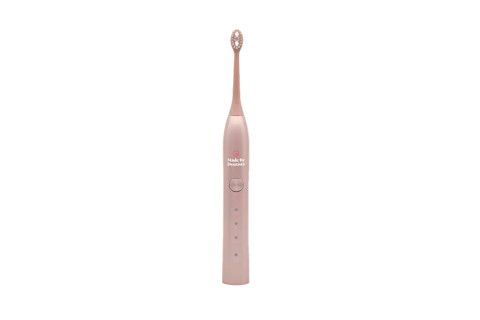Professional Teeth Whitening: Cost, Benefits, Aftercare & More
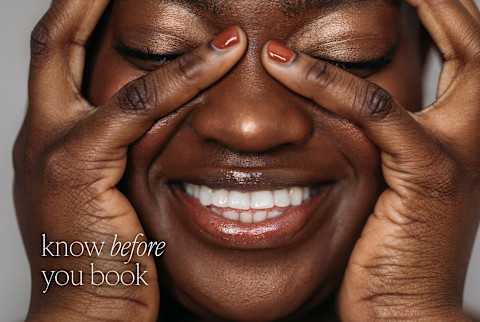
I've tried my fair share of at-home whitening treatments, some with more success than others. But no matter how hard I tried (or how much money I spent), the results were never that noticeable. In fact, sometimes I could be caught trying to convince myself that I saw any difference at all…and I doubt I'm the only one.
So, I set out on the journey to give professional whitening a try. I went in as a skeptic with some fear of new tooth sensitivity as a result. Luckily, I was met with a breezy experience and unexpectedly learned that the benefits of these treatments extend beyond cosmetic improvements.
To come, everything you need to know about professional teeth whitening. I'll go over benefits and aftercare tips, share photos of my results, and offer some expert advice from dentists so you can know what to expect when you book your appointment.
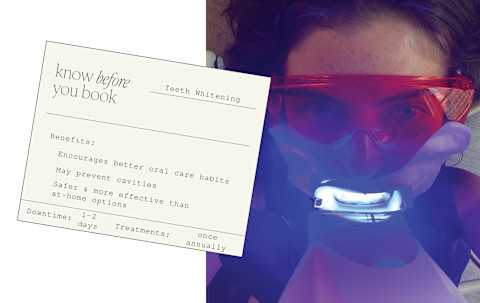
How are professional treatments different?
First up, how are professional treatments any different from at-home whitening strips, pens, and kits? According to board-certified cosmetic dentist Kevin Sands, DDS, the key difference lies in the strength of the bleaching agents.
"Professional teeth whitening uses a more effective process," he says. "The hydrogen peroxide content of your at-home kit is very low, whether you are using toothpaste, liquid-filled trays, or strips, dentists are able to use a stronger process."
Given the strength of these professional treatments, the cadence at which you'll whiten your teeth will also change. Many people use at-home products once a month or more, but as board-certified celebrity cosmetic dentist Victoria Veytsman, DDS, told mbg, those seeking professional whitening treatment only need to come in once or twice annually because the results last much longer.
There are different types of teeth whitening available in the office, some using lasers while others use blue light. Regardless of the mechanism, they all include some kind of hydrogen peroxide treatment. No method is better than the other; it just depends on what dentist you visit.
| Quick facts | Summary | |
|---|---|---|
| Benefits | whitening/encourages better oral care/may prevent cavities | |
| Cost | $200-$1 | 000+ |
| Sessions recommended | once a year | |
| Downtime | 1-2 days |
Benefits
Now let's dive into the benefits of these treatments:
It's safer than at-home treatments
Sands notes that professional treatments are much safer than at-home options. "This is because you may overuse the abrasive bleaching agent as you try to lift off permanent stains," he says.
When that happens, the protective tooth enamel gets damaged, which can lead to a host of problems—including increasing your risk of cavities, increasing sensitivity to cold and hot temperatures, and may even make your teeth more susceptible to stains.
Not to mention, dentists block out your gums when performing whitening treatments (more on why in a bit), but at-home treatments may touch the gums and cause sensitivity.
It encourages better oral care practices
A professional teeth whitening treatment is sure to inspire you to take better care of your teeth, similar to how you'd treat your skin after investing in an expensive facial. While this may not apply to everyone, it's certainly a common outcome.
After your whitening treatment is over, you'll likely feel more confident in your smile and thus be even more motivated to commit to daily flossing and brushing to keep up the bright white appearance.
May improve overall oral health
As mentioned above, there are oral health benefits, too. "Professional teeth whitening can help to improve your oral health by removing stains and discoloration from your teeth," Sands explains.
"This can help the appearance of your teeth look brighter and whiter—as well as help to reduce the risk of cavities and other oral health problems," he notes.
Plus, better oral care practices lead to improved oral health as well—so it's a positive domino effect.
May boost confidence
While some people may say teeth whitening is a vanity-driven affair, your smile does have a significant impact on your confidence and therefore your mental health.
As Veytsman says, "It's like an instant boost," especially when compared to other dental procedures that take more time and cost more money.
What to expect
During
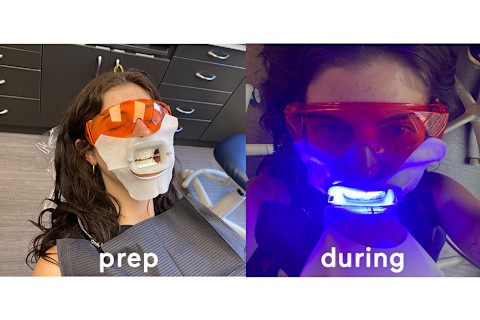
Step 1: Chat with your dentist
Before your whitening treatment, you'll want to have an open and honest conversation with your dentist. You'll want to share the following so they know how to proceed:
- Your at-home oral care routine
- Past whitening treatments (at-home or professional)
- Sensitivity to foods, temperatures, etc.
- Any history of cavities, fillings, or dental complications they may not know about
The whole process of professional teeth whitening is fairly straightforward. However, I ran into some sneaky nuances along the way I'll share below. First I'll go over the process at the dentist's office, then I'll take you through the recommended aftercare routine I followed.
If you booked with your go-to dentist, then they probably already have your dental records. If you go to another expert, I'd suggest sending over a copy of your records so they can have those on hand, as any active cavities or dental complications will prevent you from completing the whitening treatment—more on that later.
Step 2: Place the gum guards
After your conversation, your dentist will place a guard over your gums to protect them from the hydrogen peroxide and any lights or lasers used. This step was slightly uncomfortable for me, but nothing worse than the typical instruments used during dental X-rays.
Don't worry, you'll have glasses on to protect your eyes, too.
Step 3: Apply the hydrogen peroxide & light or laser
Next, they will apply hydrogen peroxide to your teeth, which acts as a bleaching agent. The light or laser your dentist uses will activate the hydrogen peroxide.
Here's where it gets customized: Depending on the severity of stains on your teeth, your dentist will recommend a custom strength of hydrogen peroxide and time under the light or laser. Any sensitivities you have will also alter these factors to ensure you have a comfortable and effective treatment.
So you'll be sitting in the chair for at least 30 minutes, and perhaps up to an hour depending on what your dentist recommends. During my treatment, I sat for half an hour—which was surprisingly relaxing given the instruments holding my gums back and mouth open.
Pro tip:
Step 4: Take out the tools & rinse
After your time is up, your dentist will gently remove the guards from your mouth and wipe off excess hydrogen peroxide from your teeth. Then, you'll rinse your mouth out with water.
Aftercare
Now on to aftercare because this part is crucial for the best results:
No pigmented food or drink for 24-48 hours
This one came as a bit of a shock to me, but after whitening you can't consume highly pigmented foods for at least 24 hours, and perhaps 48 hours if your dentist recommends it. For this reason, it's important to book your appointment at least a few days before any big event where you'll want to eat and drink anything you desire.
You don't have to stick to white foods necessarily, but Veytsman recommends skipping anything that would stain a white T-shirt. Think berries, red wine, tomatoes, coffee, tea, soda, pigmented fruit juices, colorful sauces, etc.—and yes, I consider this downtime, because it interrupts your normal life even though you're not held back from doing other activities.
Any foods that don't have a rich pigment are A-OK. Think white meats and fish, light-colored vegetables and fruits, etc.
I suggest shopping beforehand or right after your appointment for some staple items. I'm vegetarian, so my menu looked a bit different from many white food diets I found online, but I'll share my staples below:
- Hummus & pita
- Roasted cauliflower, mushrooms, & potatoes
- Tofu & chickpeas
- Vegan vanilla protein smoothies
- Bananas, pears, and apples
- White beans
- Yogurt
- Bread & pasta
- Water, of course
I know, it's quite boring. However, it's worth it to reap the best results from your treatments.
Keep up with your oral care routine
I was certainly inspired to keep my teeth in tiptop shape post-treatment as I'm sure many people are. Try to floss at least once a day and brush your teeth twice daily. Make sure you use white or clear toothpaste and mouthwash and skip any artificially colored options (blue, green, etc.) so you don't stain your teeth.
Shop my aftercare routine
Address any sensitivity
You may or may not feel sensitivity post-treatment and this comes from the hydrogen peroxide, as it dehydrates your teeth for a day or two, Veystman says.
She notes that about 10% of people she treats experience sensitivity, which is quite short-lived.
In my experience, I felt maybe two or three "zingers," as she calls them, which felt like slight twinges of discomfort, similar to how you may feel biting into an ice cream cone with your front teeth (cringe). Mine only lasted for an hour after the appointment, though.
To minimize discomfort, you may want to avoid any super cold or super hot foods for the first few hours after your appointment.
If you experience extended or intensely uncomfortable sensitivity, call your dentist's office.
Results
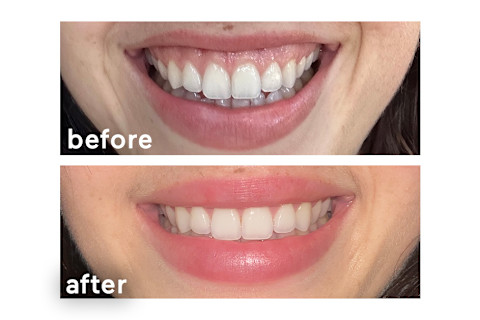
Now on to the fun part—the results. I've attached my before and after photos above for reference. I wanted to use flash photography in the second one to get a good look at my teeth, as the dimly lit images just didn't do the results justice.
Now my teeth weren't super discolored to begin with, but they were quite uneven. I noticed parts of my teeth seemed more opaquely white than others, which is a problem I've never seen success with until now.
As you can tell, my teeth after the treatment were much more even-toned, brighter, and even looked glossy. I must say, my skepticism has been dissolved.
Here's the thing: Everyone has a different "ceiling," so to speak, of how white their teeth can get with these treatments. It's similar to a suntan, Veytsman says, so no matter how white you may want your teeth to be, there is a limit, and everyone's is different.
So rather than walking into your dentist with a reference photo as you would a hair salon, know that your teeth will be able to become whiter but only to your natural limit. So, give yourself some grace if it doesn't turn out like an advertised image, and try not to compare yourself to the magic of Photoshop.
Who should & shouldn't get it
If you've been considering teeth whitening treatments and you have access to a dentist you trust, go for it. Just be sure your oral health is in good shape beforehand. For those who have tried countless at-home remedies with little to no success (I relate) this is a worthy investment.
While many people can get teeth whitening treatments, it's not for everyone. If any of the below apply to you, it's probably best to skip it or at least chat with your dentist before booking.
- You have active cavities or gum disease
- You have exposed roots
- You recently had dental or oral surgery
- You have worn enamel
- You're allergic to hydrogen peroxide
- Your dentist doesn't recommend it
- You have internal stains from antibiotics (ask your dentist if you're unsure)
Other than that, it all comes down to how important this venture is to you. If you've never felt insecure about the color of your teeth, then it's probably not worth your money.
But if this is constantly a sore spot for you and you notice the color of your teeth impacting your confidence and mental health, then professional treatments are a safe and effective option.
FAQ
How often should you get professional teeth whitening?
This totally depends on what your dentist recommends, but most experts I spoke with said once a year is generally enough. Some people may choose to get shorter, less intense "touch-ups," but that isn't necessary for everyone.
Does professional teeth whitening hurt?
Some people may experience sensitivity during and after professional teeth whitening due to the strength of hydrogen peroxide, which dehydrates the teeth, but it generally goes away within a day or two.
Can you get professional teeth whitening if you have cavities?
No, you should not get a professional teeth whitening treatment if you have any active cavities. The hydrogen peroxide used to whiten the teeth may migrate into the cavity and cause increased sensitivity. So, get your cavities treated before booking your appointment.
How much does professional teeth whitening cost?
Professional teeth whitening prices can range between $200 and over $1,000 depending on the treatment you receive, your dentist's rates, and how intense of a treatment you get. If you want to know the price beforehand, call or meet with your dentist to get an estimate.
Is professional teeth whitening covered by insurance?
Unfortunately, most professional teeth whitening services are not entirely covered by insurance. Some insurance plans may cover part of the cost, while others none at all. Talk with your dentist and your insurance provider to see if you can get any paid assistance on this treatment.
The takeaway
Professional teeth whitening can be intimidating, but the process is much more straightforward than you might think. If you don't have any active oral health concerns, it's probably right for you if you're searching for effective, safe whitening methods. Want to try at-home treatments first? Here's some of our favorites.

